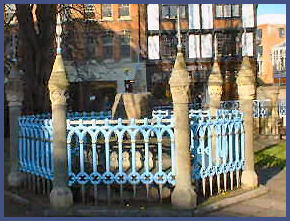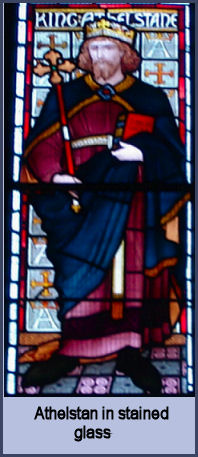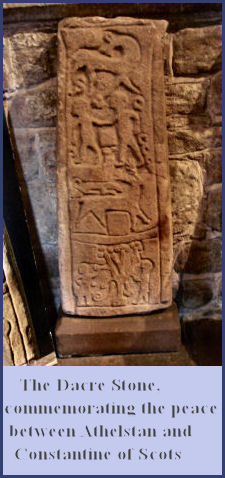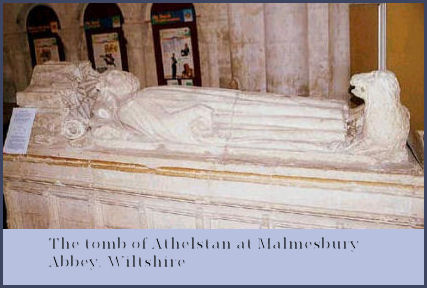Athelstan of England
894 AD to 939 AD
Richard Lionheart
1189 AD to 1199 AD
Edward I of England
1272 AD to 1307 AD
Elizabeth I of England
1533 to 1603
King Edward VII
1901 to 1910
George V
1910 to 1936
Edward VIII
1936
George VI
1936 to 1952
Elizabeth II
1952 to 2022
Charles III
2022 to present
George V
George V (George Frederick Ernest Albert; 3 June 1865 – 20 January 1936)
was
King of the United Kingdom and the
British
Dominions, and
Emperor of India, from 6 May 1910 until his death in 1936.
He was the second son of Albert Edward, Prince of Wales (later King Edward VII), and the grandson of the reigning British monarch, Queen Victoria. From the time of his birth, he was third in the line of succession behind his father and his elder brother, Prince Albert Victor, Duke of Clarence and Avondale. From 1877 to 1891, George served in the Royal Navy, until the unexpected death of his elder brother in early 1892 put him directly in line for the throne. On the death of his grandmother in 1901, George's father became King-Emperor of the British Empire, and George was made Prince of Wales. He succeeded his father in 1910. He was the only Emperor of India to be present at his own Delhi Durbar.
Reserve Powers ex Wiki
Our Liege Lady Sovereign, Her Majesty Queen Elizabeth II has reserve powers. She
can dismiss her prime minister or not. She can appoint him or not. These powers
matter. It was proved when
Sir John Kerr, the
Governor General of Australia sacked
Gough Whitlam, the
prime minister. Marxists were seriously annoyed
but Sir John was right. All is explained in
What If Sir John Kerr Had Been A Layman?
PS
Whitlam was
crooked, whence the
Khemlani Affair.
King Edward VII
He was seriously all right.
Athelstan of England ex Wiki circa 894 AD to 939 AD
QUOTE
Æthelstan or Athelstan (Old
English: Æþelstan, Æðelstān; c. 893/895 – 27 October
939) was
King of the West Saxons from 924 to 927, and
King of the English from 927 to 939. He was the son of King
Edward the Elder and his first wife,
Ecgwynn.
Æthelstan's conquest of the last remaining
Viking
kingdom, that of
York, in 927, allowed him to claim the title of 'king of the English', and
the submission of Scottish and Welsh kings later in the same year even allowed
him to call himself "by wishful extension" 'king of Britain'.[1]
Victory over Scottish and Viking forces at the
Battle of Brunanburh in 937 confirmed his prestige. His reign has been
overlooked and overshadowed by the achievements of his grandfather,
Alfred the Great, but he is now regarded as one of the greatest kings of the
West Saxon dynasty.[2]
Æthelstan was the first king of England from 927,[a]and
his reign was of fundamental importance to political developments in the 10th
century.
William of Malmesbury's view that "no one more just or more learned ever
governed the kingdom" has been endorsed by modern historians. His household was
the centre of English learning during his reign.[4]
He never married, and was succeeded by his half-brother,
Edmund.
UNQUOTE
Rather a good bloke.
Athelstan - First King Of
England [ 894(?) - 939 ]
QUOTE
Athelstan, who was the eldest son of King
Edward the Elder and
Ecgwynn was born in 895 during the latter years of the reign of his
grandfather, King Alfred
the Great. Very little is known about Athelstan's mother. Some sources
describe her as a "common law wife". There are reasons to suspect that she was
of low social status for a prince's wife. The marriage or relationship of Edward
and Ecgwynn appears to have come to end before Edward became king.
Athelstan is recorded as being a tall and handsome youth with light flaxen hair. As a youth he had been ennobled by his grandfather, of whom he was said to be a great favourite. To mark the occasion King Alfred endowed his grandson with a mantle of royal purple, a girdle set with precious stones and a Saxon seax (sword) in a golden scabbard.
As a child, Athelstan had been brought up in the care of his aunt, Ethelfleda, known as the Lady of Mercia. He was thirty years old at the time of his father's death. According to the Anglo-Saxon Chronicle Edward the Elder was succeeded by his second son Ælfweard (904-924) on 17th July 924, while Athelstan inherited the sub kingdom of Mercia. Ælfweard, who was probably never crowned, died on 2nd August, 924 at Oxford, possibly on the orders of Athelstan, who then succeeded to the throne of all England. William of Malmesbury describes Athelstan as being fair haired, slender and of middle height.
Conspiracies against the new king's rule formed in the early months of Athelstan's reign, lead by one Alfred, who was probably a member of the Saxon Royal House. The Kings brother, Edwin, was in 933 accused of being party to this conspiracy, despite his strong protestations to the contrary.
Kingston-upon-Thames
Athelstan was crowned with much splendour at Kingston-upon -Thames on 4
September, 925. Kingston was the traditional site of the coronation of the
Saxon Kings, seven of which where crowned there. In accordance with an
ancient custom, they took possession of their throne standing upon a large
rock.

The stone still exists, standing outside the Guildhall at
Kingston-upon-Thames, with a silver penny from the reign of each Saxon king
set into its plinth.

Athelstan
strongly suspected his brother of complicity and became resolved to be rid of
him. To spare the King the necessity of having him executed, the unfortunate
Edwin was sent to sea in a leaking old boat without a sail and with neither
water or provisions. Dreading the prospect of drifting and starving to death,
Edwin threw himself into the sea and drowned. Athelstan was said to later regret
his conduct in the matter and did penance for this action.
The complete supremacy of the House of Wessex was firmly established under Athelstan and he could correctly be described as the first true King of all England. Athelstan used the title Basilius, the Greek term for king.
Much of his reign was occupied, as were his forefather's, with the ongoing struggle with the Viking invaders. Athelstan concluded a treaty with them at Tamworth, by the terms of which he married his sister, Edith, to the Danish leader Sithric, King of York. Sithric died the following year and Athelstan seized the opportunity to take Northumbria. His kingdom thereby became roughly equivalent in size to modern England.
The Celtic Princes of Wales paid homage to him at Bamburgh in the early part of his reign, along with Hywel, King of Cornwall, Constantine II, King of Scots and Owen of Gwent. Athelstan succeeded in expelling the Cornish from Exeter and established the border with Cornwall as the River Tamar.
In the year 937, Constantine II of Scotland in alliance with Eógan of Strathclyde and Olaf Guthfrithson, King of Dublin, invaded England. The King marched an army north to meet them, gaining a glorious victory at the Battle of Brunanburh in 937, against a combined invasion force of Vikings and Scots. The Annals of Ulster record the battle as:-
' a great battle, lamentable and terrible was cruelly fought...in which fell uncounted thousands of the Northmen. ... And on the other side, a multitude of Saxons fell; but Æthelstan, the king of the Saxons, obtained a great victory'

Brunaburh
is thought to have been one of the bloodiest of the period. Five English kings
and seven earls lost their lives in the carnage. The kings cousins Alfric and
Athelwin and a prominent Saxon bishop were also among the casualties. The events
of the battle are unclear, but according to some sources the West Saxons mounted
a cavalry charge on the enemy, directly contradicting the popular belief that
the early English fought on foot. Cavalry in the Saxon force were most likely to
be mercenaries, however, the Anglo-Saxon Chronicle itself makes no such mention
of a cavalry charge and it is believed that the mention of the Saxons using
cavalry has arisen through a mistranslation the Anglo-Saxon 'eorodcistum,' which
means troop not cavalry.
Constantine of Scotland fled the battlefield after his son was killed in the fighting. The Anglo-Saxon Chronicle records the King's resounding victory in the form of a jubilant poem in celebration of the event:-
'The hoary man of war had no cause to exultin the clash of blades; he was shorn of his kinsmen,
deprived of friends, on the meeting place of peoples,
cut off in strife, and left his son
on the place of slaughter, mangled by wounds,
young in battle. The grey-haired warrior,
old crafty one, had no cause to boast'
Despite its fame, the site of the battle remains uncertain and theories have been debated linking it to several sites including Burnswark in southwest Scotland, Tinsley Wood near Sheffield, Yorkshire and Axminster in Devon, however Bromborough on the Wirral Peninsula remains the most likely candidate. This battle remains one of great importance in British history since Athelstan's utter and crushing defeat of the combined Norse-Celtic force ranged against him irrevocably confirmed England as an Anglo-Saxon kingdom, forcing the Celtic kingdoms to consolidate in the positions they have occupied to the present day.
Political alliances were arranged through the marriages of the King's
sisters. He married one of his many sisters to Sithric Cáech (meaning the
'Squinty'), the Viking King of Yorvik (York) the marriage took place at Tamworth
and resulted in Sithric acknowledging Athelstan as over-king and converting to
Christianity. His sister Edith was married to the Holy Roman Emperor, Otto I and
another sister, Edgifu became Queen of France through her marriage to Charles
the Simple. He also married one of his sisters to the Viking Egil Skallagrimson,
the subject of an Icelandic saga and a further sister's marriage forged a
political alliance with Alan II of Brittany.

Athelstan
was an able administrator and made many good laws, which combated theft,
oppression and fraud and mitigated severity to young offenders. He was
charitable and popular and like his great-grandfather Ethelwulf, made
provisions for his poorer subjects. Athelstan directed that each of the manors
owned by the crown should be subject to an annual charge, which should be used
to relieve the poor and the destitute. The Annals of Ulster refer to him as 'a
pillar of dignity in the western world'.
King Athelstan died on 27th October, 940, at Gloucester, aged forty-four, after a sixteen year reign and chose to be buried at Malmesbury Abbey in Wiltshire, a favourite of his, in preference to his family mausoleum at Winchester. Although his tomb still survives, his body was lost decades after his death.
William of Malmesbury wrote of him two hundred years later ' The firm opinion is still current among the English that no one more just or learned administered the state.'
External Links
Saxon Stone commemorating the Peace of Dacre
Bromborough, on the Wirral Peninsula, most likely candidate for the site of the Battle of Brunanburh
Viking Wirral
UNQUOTE
Still thought a good bloke.
Elizabeth I of
England ex Wiki
QUOTE
Elizabeth I (known simply as "Elizabeth" until the accession of
Elizabeth II; 7 September 1533 – 24 March 1603) was
queen regnant of
England and
Ireland from 17 November 1558 until her death. Sometimes called "The
Virgin Queen", "Gloriana" or "Good Queen Bess", Elizabeth was
the fifth and last monarch of the
Tudor dynasty. The daughter of
Henry VIII, she was born a princess, but her mother,
Anne
Boleyn, was executed two and a half years after her birth, and Elizabeth was
declared illegitimate. Her half-brother,
Edward VI, bequeathed the crown to
Lady Jane Grey, cutting his two half-sisters, Elizabeth and the Catholic
Mary, out of the succession in spite of
statute law to the contrary. His will was set aside, Mary became queen, and
Lady Jane Grey was executed. In 1558, Elizabeth succeeded her half-sister,
during whose reign she had been imprisoned for nearly a year on suspicion of
supporting Protestant rebels.
Elizabeth set out to rule by good counsel,[1] and she depended heavily on a group of trusted advisers led by William Cecil, Baron Burghley. One of her first moves as queen was the establishment of an English Protestant church, of which she became the Supreme Governor. This Elizabethan Religious Settlement later evolved into today's Church of England. It was expected that Elizabeth would marry and produce an heir so as to continue the Tudor line. She never did, however, despite numerous courtships. As she grew older, Elizabeth became famous for her virginity, and a cult grew up around her which was celebrated in the portraits, pageants, and literature of the day.
In government, Elizabeth was more moderate than her father and half-siblings had been.[2] One of her mottoes was "video et taceo" ("I see, and say nothing").[3] In religion she was relatively tolerant, avoiding systematic persecution. After 1570, when the pope declared her illegitimate and released her subjects from obedience to her, several conspiracies threatened her life. All plots were defeated, however, with the help of her ministers' secret service. Elizabeth was cautious in foreign affairs, moving between the major powers of France and Spain. She only half-heartedly supported a number of ineffective, poorly resourced military campaigns in the Netherlands, France, and Ireland. In the mid-1580s, war with Spain could no longer be avoided, and when Spain finally decided to attempt to conquer England in 1588, the failure of the Spanish Armada associated her with one of the greatest victories in English history.
Elizabeth's reign is known as the
Elizabethan era, famous above all for the flourishing of
English drama, led by playwrights such as
William Shakespeare and
Christopher Marlowe, and for the seafaring prowess of English adventurers
such as
Sir Francis Drake. Some historians are more reserved in their assessment.
They depict Elizabeth as a short-tempered, sometimes indecisive ruler,[4]
who enjoyed more than her share of luck. Towards the end of her reign, a series
of economic and military problems weakened her popularity. Elizabeth is
acknowledged as a
charismatic
performer and a dogged survivor, in an age when government was ramshackle and
limited and when monarchs in neighbouring countries faced internal problems that
jeopardized their thrones. Such was the case with Elizabeth's rival,
Mary, Queen of Scots, whom she imprisoned in 1568 and eventually had
executed in 1587. After the short reigns of Elizabeth's half-siblings, her 44
years on the throne provided welcome stability for the kingdom and helped forge
a sense of national identity.[2]
UNQUOTE
The public think better of Good Queen Bess than the Wiki. They are right.
Elizabeth II
QUOTE
Monarchy, Nation-States And The Failed Reign of Elizabeth The Useless -
http://www.vdare.com/gabb/110429_monarchy.htm
By
Sean Gabb
At the last
Royal Wedding, back in 1981, I spent most of the day in bed, listening to Die
Meistersinger. This time, I was bullied by my (Slovak
immigrant!) wife and our daughter into having a shave and watching every
ghastly detail on the telly..........
Why is the English Monarchy is at once so important to England—I prefer this honest tribal term to the now-obsolescent “Britain”—and recently so disappointing?...........
It is the function of the Monarchy both to express and to sustain England’s national identity and all that stands with it. The Monarchy reminds us that our nation is not some recent arrival in the world, and that the threads of continuity between ourselves and our distant forebears—what Abraham Lincoln called “the mystic chords of memory”—have not been broken. England and its monarchy exist today, and five hundred years ago, and a thousand years ago, and one thousand five hundred years ago. And, as we go further back, they vanish together, with no sense that they ever began at all, into the forests of Northern Europe.
But what makes the Monarchy nowadays so disappointing is that Her Present Majesty—“Elizabeth the Useless”—has, during the fifty nine years of her reign, been an absolute failure at discharging any of her positive functions...........
But the very real public
interest shown in her grandson’s wedding has not been merely about pretty
clothes and music. We have seen our next King but one. We can ask if he will be
a Patriot King—or yet another front for revolution.
UNQUOTE
Doctor Gabb is very much on the right lines. Her Majesty is, at best very
badly advized. A mixture of stupidity, idleness, bad advice and moral cowardice
is likely.
Edward VIII 1936
Became King then abdicated to marry an American slut. He was a Nazi sympathiser,
traitor and deserter to boot. See:-
http://www.dailymail.co.uk/news/article-2973681/Edward-Nazi-King-England-Princess-Dianas-biographer-reveals-Duke-Windsor-s-collusion-Hitler.html
http://www.express.co.uk/expressyourself/113232/The-Nazi-King gross
traitor
http://www.telegraph.co.uk/news/uknews/theroyalfamily/6624594/Revealed-the-Duke-and-Duchess-of-Windsors-secret-plot-to-deny-the-Queen-the-throne.html
wanted back in after George VI died
http://www.spunk.org/texts/writers/meltzer/sp001493.html treason, crime,
dubious source
http://www.theguardian.com/uk/2002/jun/29/research.monarchy Simpson was
a Nazi sympathiser, a slut who fornicated with Joachim von Ribbentrop,
traitor too. Hated England.
Edward VIII Was Betrayed By The Slut He Married ex Daily Mail [
QUOTE
The morning after her wedding to the man who had proven his devotion
to her by giving up the throne, the Duchess of Windsor woke up to find her
husband 'standing beside the bed with this innocent smile, saying, 'And now
what do we do?'
As she later told the American writer Gore Vidal: 'My heart sank. Here was someone whose every day had been arranged for him all his life and now I was the one who was going to take the place of the entire British government, trying to think up things for him to do.'
The day before, at the Duke and Duchess's wedding in France in 1937, friends had noticed how cold her behaviour was towards him. So it is perhaps not surprising that she soon began her first post-marital affair.
Unknown to Wallis, her meetings with her lover were being logged by the British Secret Service, who'd been asked by the Government to keep an eye on both her and the Duke of Windsor. Soon, the affair was fuelling high-society gossip.
The diarist Chips Channon was the first to record this latest tidbit,
told to him by a rich American in May 1939: 'Mr [William] Bullitt — the
American ambassador in Paris — is madly in love with the Duchess of
Windsor.'
UNQUOTE
Why did anyone give her the time of day, let alone anything more?
George VI
1936 -
1952
George VI (Albert Frederick Arthur George; 14 December 1895 – 6 February
1952) was
King of the United Kingdom and the
Dominions
of the
British Commonwealth from 11 December 1936 until his death. He was the
last
Emperor of India and the first
Head of the Commonwealth.
As the second son of King George V, he was not expected to inherit the throne and spent his early life in the shadow of his elder brother, Edward. He served in the Royal Navy and Royal Air Force during the First World War, and afterward took on the usual round of public engagements. He married Lady Elizabeth Bowes-Lyon in 1923 and they had two daughters, Elizabeth and Margaret.
Harold Macmillan wrote well of him in his book, War Diaries: Politics and War in the Mediterranean, January 1943-May 1945
George V
1865 - 1936
George V (George Frederick Ernest Albert; 3 June 1865 – 20 January 1936)
was
King of the United Kingdom and the
British
Dominions, and
Emperor of India, from 6 May 1910 until his death in 1936.
He was the second son of Albert Edward, Prince of Wales (later King Edward VII), and the grandson of the reigning British monarch, Queen Victoria. From the time of his birth, he was third in the line of succession behind his father and his elder brother, Prince Albert Victor, Duke of Clarence and Avondale. From 1877 to 1891, George served in the Royal Navy, until the unexpected death of his elder brother in early 1892 put him directly in line for the throne. On the death of his grandmother in 1901, George's father became King-Emperor of the British Empire, and George was made Prince of Wales. He succeeded his father in 1910. He was the only Emperor of India to be present at his own Delhi Durbar.
Richard Lionheart ex Wiki 1189 - 1199
Richard was highly thought of but it turns out that he was in the hands of
the Jews - see
On The Left and the Myth of the ‘Jewish Proletariat’
Richard I (8 September 1157 – 6 April 1199) was
King of
England from 6 July 1189 until his death. He also ruled as
Duke of Normandy (as Richard IV),
Duke of Aquitaine,
Duke of Gascony, Lord of
Cyprus,
Count of Poitiers,
Count of Anjou,
Count of Maine,
Count of Nantes, and Overlord of
Brittany
at various times during the same period. He was the third of five sons of
King
Henry II of England and
Eleanor of Aquitaine. He was known as
Richard Cœur de Lion or Richard the Lionheart because of
his reputation as a great military leader and warrior.[1]
He was also known in
Occitan as Oc e No (Yes and No), because of his reputation
for terseness.[2]
By the age of 16, Richard had taken command of his own army, putting down rebellions in Poitou against his father.[1] Richard was a central Christian commander during the Third Crusade, leading the campaign after the departure of Philip II of France and scoring considerable victories against his Muslim counterpart, Saladin, although he did not retake Jerusalem from Saladin.[3]
Richard spoke both French and Occitan.[4] He was born in England, where he spent his childhood; before becoming king, however, he lived for most of his adult life in the Duchy of Aquitaine in the southwest of France. Following his accession he spent very little time, perhaps as little as six months, in England; most of his life as king was spent on Crusade, in captivity, or in actively defending his lands in France. Rather than regarding his kingdom as a responsibility requiring his presence as ruler, he has been perceived as preferring to use it merely as a source of revenue to support his armies.[5] Nevertheless, he was seen as a pious hero by his subjects.[6] He remains one of the few kings of England remembered by his epithet, rather than regnal number, and is an enduring iconic figure both in England and in France.[7]